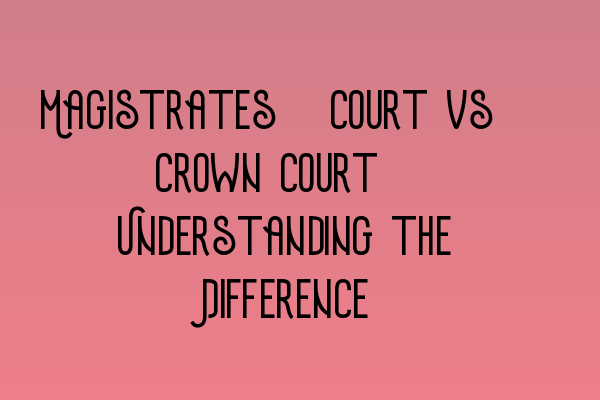Magistrates’ Court vs. Crown Court: Understanding the Difference
When it comes to criminal law in the UK, two important courts come into play: Magistrates’ Court and Crown Court. Understanding the differences between these two courts is crucial for anyone involved or interested in the criminal justice system.
Magistrates’ Court
Magistrates’ Court is often the first point of contact for most criminal cases. It deals with a wide range of offenses, from minor offenses like petty theft and public order offenses to more serious offenses like assault and drug-related crimes. Magistrates’ Court is presided over by lay magistrates or district judges and has limited sentencing powers.
One significant advantage of the Magistrates’ Court is its speed. Cases are generally resolved faster compared to Crown Court, ensuring swift justice for minor offenses. Additionally, the process is less formal, and there is no requirement for a jury trial. This helps in reducing costs and expediting the proceedings.
However, it’s important to note that Magistrates’ Court has limitations. It can only impose a maximum sentence of up to six months for a single offense and 12 months for multiple offenses. For more serious offenses or cases that require a more in-depth examination, the case may be sent to the Crown Court.
Crown Court
Crown Court is a higher court that deals with more severe criminal cases. It hears cases that have been sent for trial after the initial hearing at the Magistrates’ Court. Crown Court cases are handled by professional judges, and for serious offenses, a jury is present to determine guilt or innocence.
Some of the crimes tried at the Crown Court include murder, rape, robbery, and cases involving complex legal issues. Crown Court has the authority to impose more severe penalties, including longer prison sentences and higher fines.
While there may be delays in the Crown Court due to its higher caseload and increased formalities, it provides an opportunity for a more comprehensive and fair trial. The presence of a jury ensures a diverse perspective, and the defendant has the right to legal representation.
Choosing the Right Court
Understanding the differences between Magistrates’ Court and Crown Court is essential for individuals facing criminal charges or those involved in legal proceedings. It helps in making informed decisions regarding legal representation and understanding the potential outcomes of their case.
If you require legal advice or representation for a criminal matter, it’s crucial to consult with experienced criminal solicitors who can guide you through the legal process. They will assess your case and recommend the most appropriate court for your specific situation.
For more information on criminal law, the SQE exams, and legal practice, check out our related articles:
- SQE 1 Practice Exam Questions
- SQE 1 Practice Mocks FLK1 FLK2
- SQE 2 Preparation Courses
- SQE 1 Preparation Courses
- SRA SQE Exam Dates
At SQE Criminal Law & Practice Law UK, we provide comprehensive legal services and expert advice for criminal cases. Our team of experienced solicitors is well-versed in both Magistrates’ Court and Crown Court proceedings.
Whether you are looking for legal representation, preparing for the SQE exams, or seeking guidance on legal practice, we are here to assist you. Contact us today for a confidential consultation.
